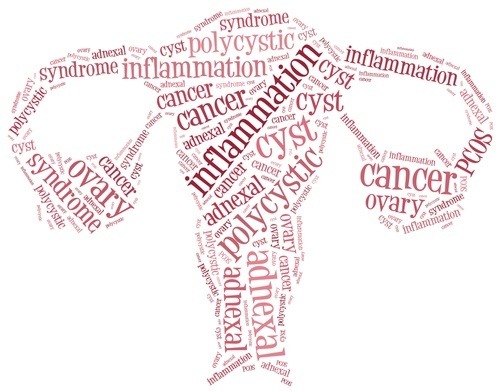Genetic Factors in PCOS
There is some evidence to suggest a genetic component in PCOS, but it does not appear to be strictly passed from parents to children. It is possible that inheriting certain combinations of genes may increase the likelihood of acquiring the syndrome, and those genes controlling signalling pathways in the ovary have come under scrutiny. As with most complex genetic situations it is possible that other environmental factors such as diet and lifestyle play a role.
Insulin and Hormone Imbalance in PCOS
The hormone insulin is involved in controlling blood sugar levels. It increases the ability of fat and muscle to take in sugar from the blood. When blood sugar levels rise, after a meal for example, insulin is produced by the pancreas and this causes the body tissues to become more efficient at taking in the sugar, so blood sugar levels fall back to normal.
Women with PCOS often have what is called insulin resistance. This means that their body does not respond as efficiently to insulin by taking sugar out of the bloodstream into tissue. In order to keep the blood sugar levels normal, more insulin is produced.
Another effect of insulin is to make the ovaries produce increased amounts of testosterone. Although testosterone is thought of as a male hormone, it is naturally produced by the ovary where some of it is converted to oestrogen. It is just that men produce much more testosterone than women. High levels of insulin and testosterone can disrupt normal follicular development so that many follicles develop but do not proceed to full maturity, but at the same time do not disappear as normal. This gives rise to failure to ovulate and the accumulation of ovarian cysts. The high testosterone levels are also responsible for the thinning of scalp hair and excessive body and facial hair growth which sometimes accompany PCOS. Higher than normal levels of luteinising hormone (LH) is often found in women with PCOS due to higher production by the pituitary gland. LH stimulates production of oestrogen by the ovary, and works alongside insulin to cause increased testosterone production.
Weight and PCOS
Excess body fat can cause the body to produce more insulin than normal and as already described the increased insulin levels can have an adverse effect on the ovary and increase testosterone production. Being overweight can make the symptoms of PCOS worse. Women with insulin resistance may also find it more difficult to lose weight as elevated insulin levels can themselves lead to weight gain.
Treatment of PCOS
There is no absolute cure for PCOS, but its symptoms can be treated effectively in most cases. Given that PCOS varies so widely in its symptoms and probable causes, no single treatment is ideal for all women. Your doctor will discuss your individual symptoms and the best way to manage them. One of the major reasons for seeking treatment is the desire to have a baby and there are several options for treatment here. There are also some non-fertility related treatments that are aimed at reducing the sometimes distressing symptoms of PCOS.
Managing Weight Loss
In women who are insulin resistant the priority is to lower insulin levels. This is most naturally achieved by exercise and improved diet, especially reducing processed sugary foods. Even a modest weight loss of a few kilograms can result in reduced insulin levels and the re-establishment of ovulation and regular periods.
Metformin
In some cases the medicine Metformin, used for many years in diabetes, is prescribed. Metformin makes the response to insulin in the muscles and liver last longer, and so less insulin is produced. This can help break the cycle of increased insulin causing persistence of ovarian cysts and the overproduction of testosterone. Lower insulin also makes weight loss easier when combined with an appropriate diet and exercise. Metformin has been shown to be effective in reducing the symptoms of PCOS in women who show signs of insulin resistance although current thinking is that this might be a side-effect from weight loss.
Clomiphene Citrate (Clomid)
This treatment is particularly appropriate for women wishing to conceive. Clomiphene is a medicine that blocks the inhibiting action of oestrogen on the production of follicle stimulating hormone (FSH) by the pituitary gland. The effect is that more FSH is produced and this stimulates the follicles to complete their maturation.
Ovulation Induction
This is a fertility treatment and involves the administration of FSH in order to stimulate the ovaries to maturity. It carries the risk of multiple pregnancy, and possible complications through overstimulation of the ovaries, so it is carried out under close supervision by the doctor and is usually monitored by ultrasound and blood tests. Ovulation may be stimulated by a trigger injection of hCG (human chorionic gonadotrophin) and in this situation intercourse can be timed accordingly.
IVF Treatment
In vitro-fertilisation is a more comprehensive treatment which begins similar to ovulation induction in that FSH is given. In this case however, the FSH is a much higher dose which is designed to cause the maturation of many follicles. Other medicine to downregulate the natural production of FSH and LH is also taken. The development of the follicles is closely monitored by ultrasound. When the follicles reach maturity the eggs are collected surgically and fertilised with sperm in the laboratory. Resulting embryos are carefully cultured for between 3 and 5 days before one is carefully placed into the womb. Any remaining embryos can be frozen for later use.
Conclusion
It is important that women with suspected PCOS have the cause of their problem determined. If insulin resistance plays a large part then there is an increased risk of diabetes, heart disease and stroke and these issues must be addressed in their own right. Each case of PCOS is somewhat unique and there is no single approach that is perfect for all women. Careful diagnosis and thorough consultation with your fertility doctor or endocrinologist should result in the best combination of therapy appropriate to your needs.

